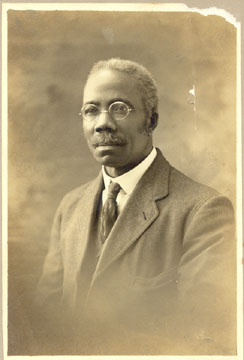 Augustus Nathaniel Lushington was the first African American to earn a Doctor of Veterinary Medicine (D.V.M.), earning the doctorate from the University of Pennsylvania in 1897. After practicing in Philadelphia for two years, he became an instructor in veterinary sanitation and hygiene at Bell Mead Industrial and Agricultural College at Rock Castle, West Virginia. He later resigned and returned to private practice in very segregated Lynchburg, Virginia, where he became known for the proficient and high-class service that he offered.
Augustus Nathaniel Lushington was the first African American to earn a Doctor of Veterinary Medicine (D.V.M.), earning the doctorate from the University of Pennsylvania in 1897. After practicing in Philadelphia for two years, he became an instructor in veterinary sanitation and hygiene at Bell Mead Industrial and Agricultural College at Rock Castle, West Virginia. He later resigned and returned to private practice in very segregated Lynchburg, Virginia, where he became known for the proficient and high-class service that he offered.
Augustus Nathaniel Lushington was born August 1, 1869 on the island of Trinidad. His paternal grandfather from DR Congo, was brought to Trinidad to work at the sugar plantation on the island, and his father, William, worked as a butcher, who raised produce for sale at market and did farm work. Young Lushington went to teacher-training school and worked as a teacher and principal for many years. He left for Venezuela, where he worked as a clerk in the town of La Guayra for a British-owned railroad. After three years, Lushington went back to Trinidad but found that opportunities were insufficient on the island.
In 1889, he went to the United States, meeting his wife Elizabeth Gavino Hubert (from Antigua), the following year. His wife’s West Indian friends helped Lushington enrolled in Cornell University to study Agriculture. He graduated with a degree in Agriculture in 1894. Since there was no work for him at the time he attended the University of Pennsylvania veterinary school finishing the program in three years. Lushington became the first Black man to earn a Doctor of Veterinary Medicine (D.V.M.). He earned his doctorate from the University of Pennsylvania in 1897. When students walk into the University of Pennsylvania the first thing they see is a portrait of Augustus Lushington in the main entrance of the main building.
Lushington began his career of being a veterinarian treating farm animals. He set up a veterinary practice in Philadelphia but remained there for only two years, before becoming an instructor in Veterinary Sanitation and Hygiene at Bell Mead Industrial and Agricultural College at Rock Castle, Virginia. Deciding to return to his veterinary practice he opened his practice in Lynchburg, Virginia, after learning that there was only one other veterinarian. Lushington treated cows, horses, and other livestock, often walking for miles through the woods from Lynchburg to reach the farms where his services were needed. His philosophy, according to Arthur Bunyan Caldwell’s History of the American Negro: Virginia Edition, was that “the first essential to progress is a better understanding between the best elements of the two races.” This, he believes, would lead to closer and more harmonious relationships; mutual confidence and both races would gain as all advanced toward better citizen-ship. In Virginia, however, Lushington experienced neither harmonious relationships nor good citizenship. Whyte farmers often availed themselves of his services but then refused to pay him—and in the repressive atmosphere of the South in the early 1900s, Lushington had neither the option of taking legal action nor even the practical right to refuse services to deadbeats.
Since the pay was little for a veterinarian and whyte people refused to pay him, he decided to take on other responsibilities. Lushington was a statistical reporter to the Bureau of Animal Industry, the Federal Department of Agriculture, and a member of the Lynchburg Chamber of Commerce.
Augustus Lushington died on February 12, 1939. He and his wife had three daughters. One daughter, Drucilla Moultrie, taught in Lynchburg schools for about fifty years. Another daughter, Bernetta Parks, worked for Bennett College in Greensboro, North Carolina. The third daughter is not mentioned enough to find her records.
Source:
http://www.aaregistry.org/historic_events/view/augustus-lushington-born
https://en.wikipedia.org/wiki/Augustus_Nathaniel_Lushington


